Suchergebnisse für "Factsheet: Energietechnologien gestalten, die für alle sinnvoll und nutzbar sind"
Efficient use of biogenic resources
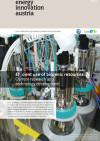
Current research and technology development
energy innovation austria
3/2017
Herausgeber: BMVIT und Klima- und Energiefonds
Englisch, 8 Seiten
Downloads zur Publikation
Polygeneration of bioethanol, biogas, electricity and heat through operating community Sun Power Plant Project GesbR.
Analysis of the economic feasibility of fuel-bioethanol production in the region Harmansdorf/Rückersdorf (NÖ), partner of Leaderregion "10 vor Wien", incorporating innovative combinations with biogas and process heat supplying plants considering also lignocellulosic material as feedstock for bioethanol- and biogas production.
New4Old - New energies for old buildings
The project "New4Old - New energy for old buildings - Promoting the integration of RES & RUE measures in historic buildings" aims to promote the integration of renewable energy and energy efficiency technologies into historic buildings, and to create a European-wide network of Renewable Energy Houses in the different Member States of the European Union.
Energy R&D 2022: Public Expenditures in Austria
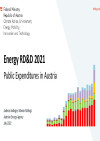
The public energy research expenditures amounted to 214.4 million euros in 2022, which is 9.6 million euros less than in the previous year.
Schriftenreihe
40/2022
A. Indinger, F. Bettin, M. Rollings
Herausgeber: BMK
Englisch
Downloads zur Publikation
Workshop: CO2 Capture and Sequestration (CCS) in Future International R & D Programmes
17. Nov 2004
WKO - Wirtschaftskammer Österreich, Rudolf Sallinger SaalVienna, AT
Initiation of a discussion process concerning the role of CCS in future RTD programmes in general and the presentation of realised (and/or planned) projects in particular as well as challenges of the deployment of CCS technologies.
CombiSol: solar combisystems for houses, state-of-the-art and potentials for improvements
Evaluation of the quality and efficiency of state-of-the-art installed solar combisystems, potentials for improvements and measures to increase the quality
Gas cleaning for low tar producer gases from staged biomass gasification
Investigation on gas cooling, on heat management in staged gasification systems, and on gas cleaning from inorganic pollutants, like ammonia and aerosols, of the low-tar producer gas in decentralized staged biomass gasification.
Digitization in the construction industry
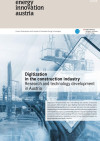
Research and technology development in Austria
energy innovation austria
4/2018
Herausgeber: BMVIT und Klima- und Energiefonds
Englisch, 8 Seiten
Downloads zur Publikation
IEA PVPS Task 15: Builiding integrated Photovoltaic (Working period 2019 - 2023)
The IEA PVPS Task 15 promotes building-integrated photovoltaics (BIPV) by overcoming technical and non-technical barriers. Despite its potential, BIPV remains largely underutilised due to economic, legal and normative barriers, lack of knowledge transfer and business models. Task 15.2 addresses these issues through research exchange and bridging gaps between BIPV stakeholders to accelerate the implementation and market penetration of BIPV.
South Burgenland Innovation Cluster
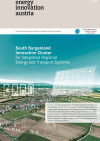
South Burgenland Innovation Cluster for Integrated Regional Energy and Transport Systems
energy innovation austria
1/2019
Herausgeber: BMVIT und Klima- und Energiefonds
Mehrsprachig, 8 Seiten
Downloads zur Publikation
Oekosan'11 - International symposium for high-quality retrofit of large-volume buildings to plus-energy-buildings
The AEE INTEC organized the international congress "ökosan'11 - high-quality retrofit of large-volume buildings to plus-energy-buildings" in September 2011. The position of Austrian companies in international cooperation was strengthened through personal contacts during the conference.
Energy R&D 2021: Public Expenditures in Austria

The public energy research expenditures amounted to 224.1 million euros in 2021, thanks to the economic stimulus plan. This is the highest value so far and an increase of 44.4%.
Schriftenreihe
22/2022
A. Indinger, M. Rollings
Herausgeber: BMK
Englisch, 123 Seiten
Downloads zur Publikation
University Plus-Energy Office High-Rise Building
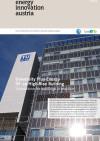
Innovations for buildings in practice
Herausgeber: BMVIT und Klima- und Energiefonds
Englisch, 8 Seiten
Downloads zur Publikation
Innovations for cool urban oases
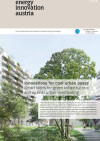
Smart ideas for green infrastructure and against urban overheating
energy innovation austria
3/2018
Herausgeber: BMVIT und Klima- und Energiefonds
Englisch, 8 Seiten
Downloads zur Publikation
Salzburg:KanS - Salzburg: Climate-neutral city
Salzburg:KanS aligns the vision and climate protection goals of the city of Salzburg with the climate neutrality targets of the province and estimates the sector-specific CO2 reduction contributions until 2030. Based on these contributions, the project develops implementation strategies for the entire city as well as the focus areas of “climate-neutral mobility” and “climate-neutral neighborhoods”.
"gugler! build & print triple zero" - subproject 3: recyclable constructing
Development of basic principles and proposals for highly recyclable constructions. A catalogue with main principles of recyclable designing with a particular focus on material inherent bonding and joint techniques as well as a selection of constructions including ecological benchmarks, calculation of building physics plus costs was created.
Passive cooling concepts for office and administrative buildings using earth-to-air and earth-to-fluid heat exchangers

Analysis of existing passive cooling concepts, examination of various other passive cooling concepts and a comparison with conventional air conditioning systems. The elaboration of practice-oriented tools for the planning and implementation of the passive cooling concepts selected.
Renewable Biopolymers as Substitution for Bulk Plastics
Biopolymers consist of renewable resources. The concept deals with the development and implementation of technologies in the sector of renewable biodegradable materials.
Active Buildings
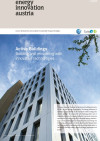
Building and renovating with innovative technologies
energy innovation austria
1/2013
Herausgeber: BMVIT & Klima- und Energiefonds
Englisch, 8 Seiten
Downloads zur Publikation
Stanz+ - An innovative, energy-flexible plus-energy district - the centre of the village Stanz
Stanz+ is working on the implementation of an energy strategy for structurally weak municipalities with specific measures for revitalisation and re-densification in the building stock as well as the integration of renewable energy sources in the municipality of Stanz im Mürztal (Styria). The project includes multipliable approaches towards energy autonomy, hybrid use of energy networks for flexible usage and an energetic revitalisation of the village centre with the involvement of users in the "Rural Pioneers Community" for the usage of energy services.
